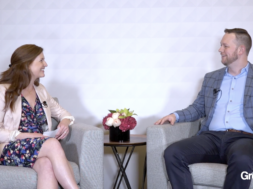A Qualified Opinion: Kelley Powell
Kelley Powell, CEO and partner of MacLaurin Group, corresponded with MMG about how private equity firms should approach technology due diligence and more.

This story originally appeared in the Spring 2021 print edition of Middle Market Growth magazine. Read the full issue in the archive.

Kelley Powell is CEO and partner of MacLaurin Group, a technology operating partner for private equity portfolios. She has served on executive teams for multiple private equity investments and is the best-selling author of “Courage to Lose Sight of Shore: How to Partner with Private Equity to Grow Your Business with Confidence.” Powell serves as board member of ACG Richmond, KAYO private equity guide and host of MacLaurin Group’s Intimate Conversation series.
Q. How should private equity firms approach technology due diligence?
The key to a good private equity partnership is relationships. How PE firms and their operating partners interact with companies prior to a transaction is a litmus test for how everyone will engage post-transaction. Technology due diligence is no different.
Technology due diligence should not be scary, complicated or hard. Rather, it should be framed as an opportunity and investment to understand an acquisition target’s existing technology, the growth you want to achieve, and how to get there together. Technology due diligence should allow for much more than running down a list of questions in a spreadsheet. If a PE firm is sending in a technical team for diligence with no guidance as to what they plan to do with the company if successful, then they are getting little to no value out of that spending.
PE firms would be best served to treat technology due diligence with the same importance as financial due diligence.
For example, if you plan on increasing the sales of the company, ask yourself if the existing technology platform will scale to support the planned growth. What if there is a new product idea you plan to build or bolt on—can the platform cope? Do you understand the investment lift needed to build out business analytics? If you determine that your investment thesis requires significant investment in technology in order to achieve it, then far better to have a handle on the required investment prior to the close of the transaction than after the fact.
Q. What impact can technology have in achieving growth or scale for a portfolio company?
It depends on the company. One size does not fit all. Technology is generally the key to successful growth and scalability of a company. Yet, it is often not considered early enough in the process.
PE firms would be best served to treat technology due diligence with the same importance as financial due diligence. While any issues found can usually be solved, they almost always take longer and are more expensive than expected. Allowing time for technology due diligence early in the process will determine the true value of a deal.
With many of our technology due diligence engagements, we are often told the company is “in the cloud.” We take the “trust but verify” attitude and perform a detailed look anyway, and we seldom find a setup without opportunity for improvement. Cloud architecture takes more than opening an account on Azure/AWS and deploying some servers.
Many companies still need a push to move away from physical data centers and operate exclusively in the cloud, allowing them to remove unnecessary overhead and housekeeping to then focus on the core business. Last year should have been a wake-up call for those needing that push: Get out of the server business and get back to your core client-facing business.
Q. How can private equity firms support portfolio leaders as they implement new technology?
Think bigger. Think longer. There is a delicate balance between completing projects short-term, in order to more quickly realize the benefit early in the investment period, while keeping long-term growth top of mind. CTOs too often think short-term with projects because they have had to think of technology as an expense throughout their careers—where they need to cut costs—rather than to look at technology through the lens of investment for growth.
There are projects you can get done in under a year. Those projects and investments are easy calls to make because you are confident you will realize the return early on during the holding period. However, some projects—usually involving legacy modernization—are multi-year efforts. These investment-heavy initiatives are the ones private equity can support and get behind, and ease the tension with the CEO and board, which may push back.
Such projects always yield their value at the end, especially in the sale price, as the next PE firm does not have to contend with the outdated legacy systems, but can build upon the modern architecture to accelerate growth.
In this installment of GrowthTV, Kelley Powell discusses some of the insights from her new book “Courage to Lose Sight of Shore,” a guide to help company owners and entrepreneurs decide if private equity is the right fit for their business—and how to navigate the M&A process when they do.


